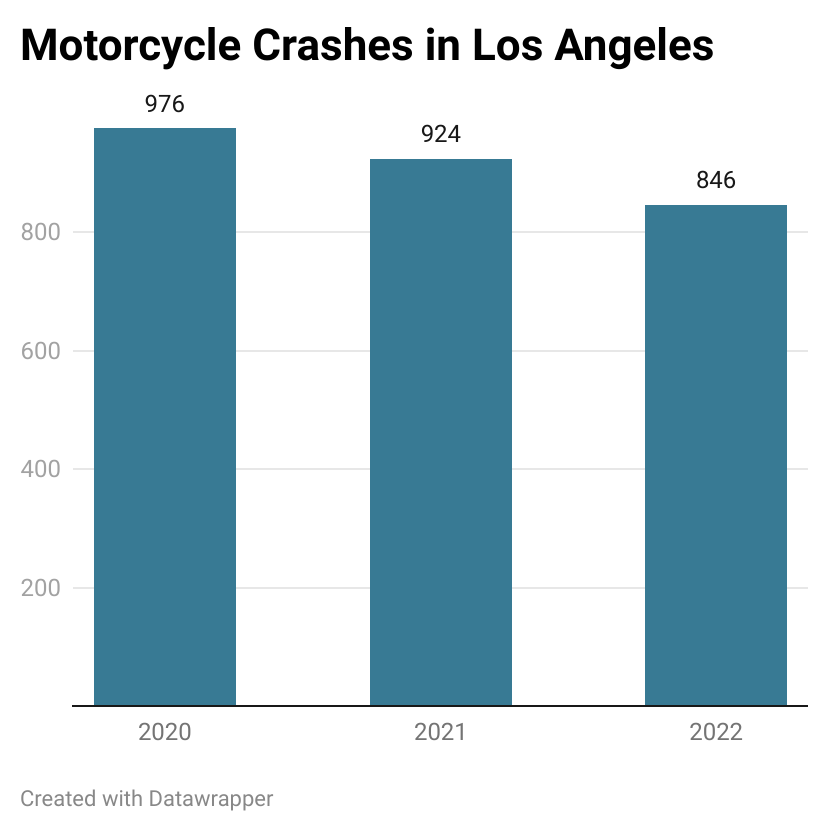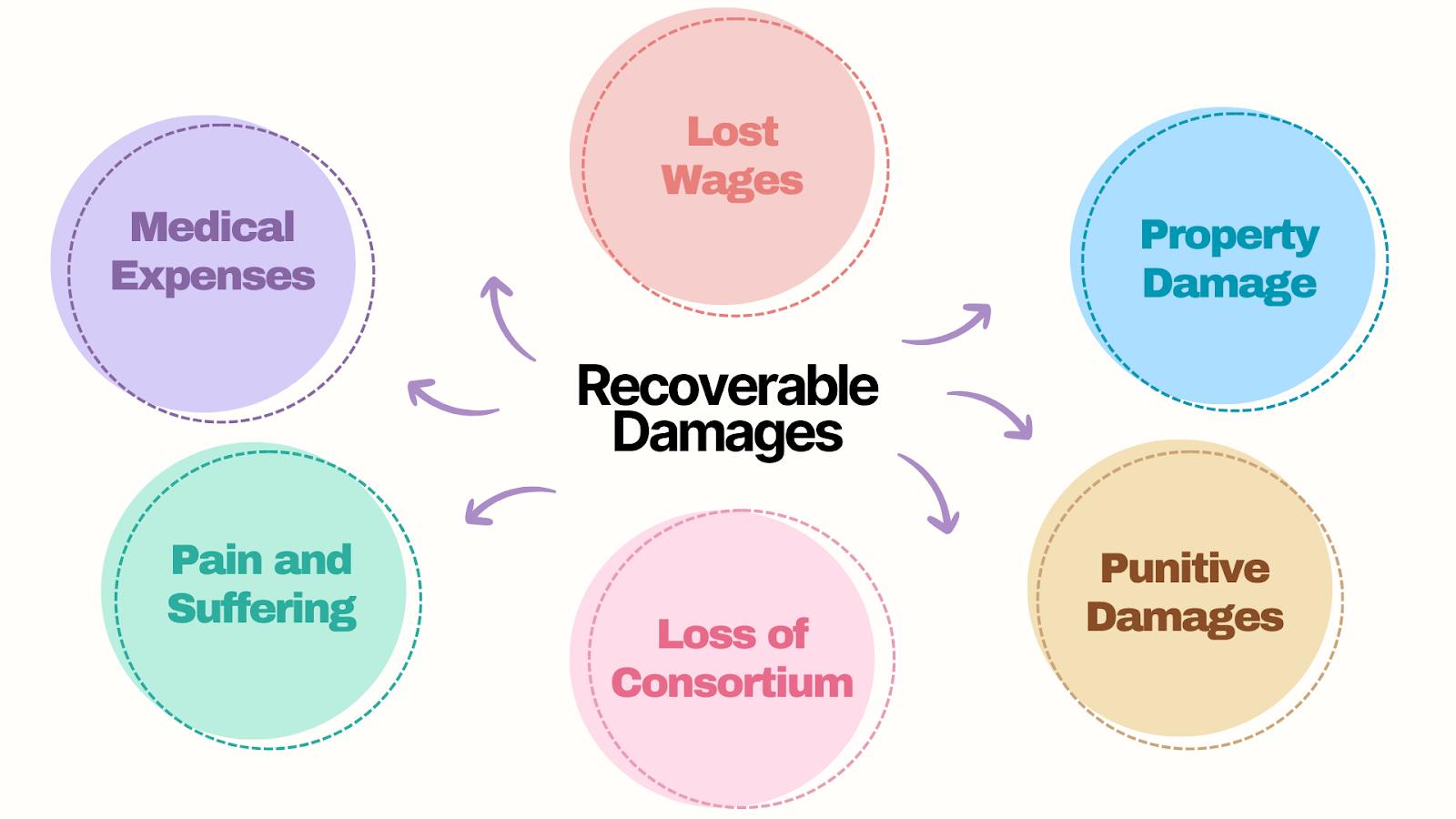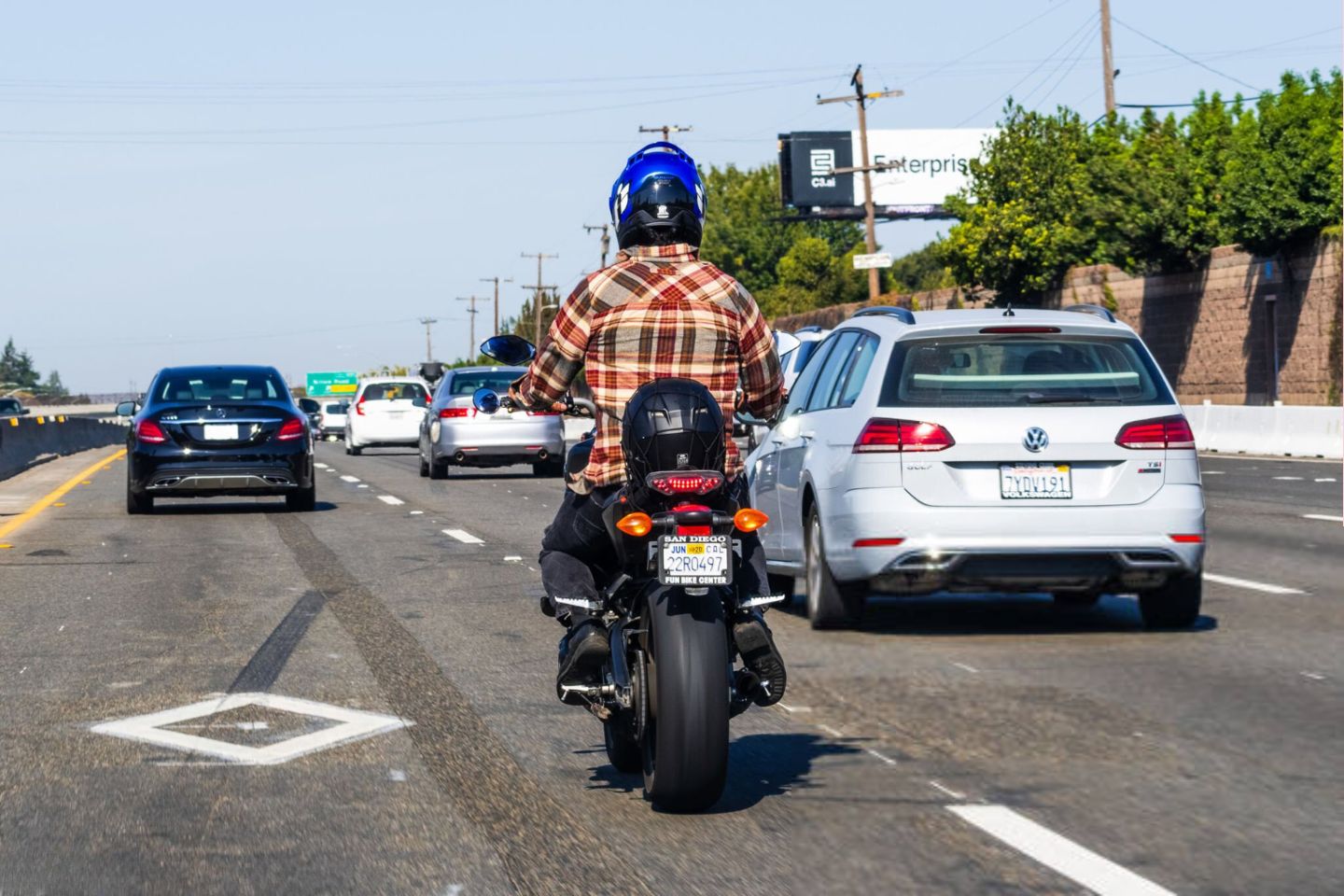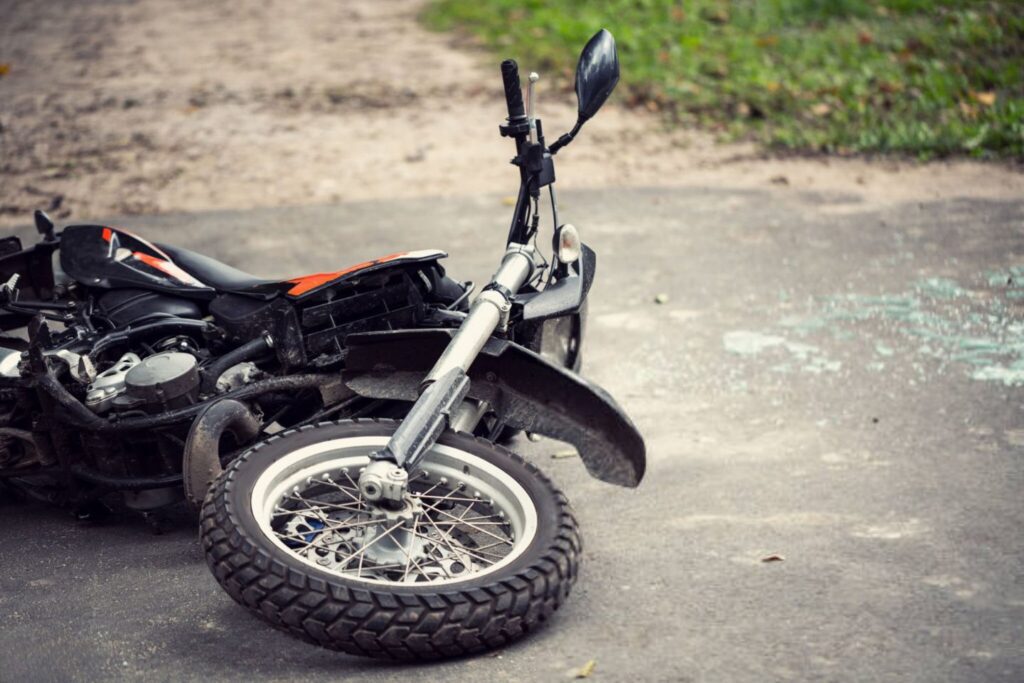According to SWITRS data, Los Angeles ranks at the top in California for motorcycle fatalities and injuries, with an annual average of 1,165 cases reported between 2018 and 2022. This statistic highlights a significant risk for riders in the region, highlighting the need for increased awareness and safety measures.


If you’ve been involved in a Woodland Hills motorcycle crash, a neighborhood known for increasing traffic accidents, and are struggling to find compensation and justice, this article is for you. Traffic crashes not only raise concerns but also emphasize the importance of understanding the specific challenges and dangers faced by motorcyclists in this area.
Immediate Aftermath of a Motorcycle Accident in Woodland Hills
The moments following a motorcycle crash in Woodland Hills can be chaotic and confusing. Knowing what to do immediately can not only ensure your safety but also significantly impact the outcome of any future compensation claims.
Here’s a checklist to help you navigate the immediate aftermath:
- Ensure Safety: Move to a safe location if you can. Ensuring your immediate safety helps prevent additional injuries. If you’re in the path of oncoming traffic, move to the sidewalk or a safe area nearby, provided you can move without worsening your injuries.
- Check for Injuries: Perform a quick self-assessment for injuries. Don’t underestimate the shock’s ability to mask pain. Look for signs of road rash, fractures, concussions, or any unusual discomfort. Checking both yourself and any passengers for visible injuries such as cuts, bruises, or possible bone displacements is crucial.
- Call 911: Report the accident to the authorities immediately. Calling 911 ensures that you get immediate medical attention and that the crash is officially documented, which is vital for insurance and legal processes.
- Exchange Information: Exchange contact and insurance details with the other party involved. Keep it brief and factual. Collect names, addresses, phone numbers, insurance information, and license plate numbers. Avoid discussing the fault or details of the accident; this conversation is for the insurance companies and police to decipher.
- Document the Scene: Take photos or videos of your motorcycle, the other vehicle(s), and the overall crash scene. Visual evidence can be compelling when filing insurance claims or if your case goes to court. Capture different angles and any visible damages or injuries.
- Witness Information: If there are witnesses, politely ask for their contact information. Witness accounts can support your version of events, adding credibility to your claim. Note down the names and contact details of anyone who saw the accident.
Recoverable Damages in a Motorcycle Crash in Woodland Hills


Understanding the types of damages you’re entitled to recover after a motorcycle crash in Woodland Hills is crucial for your comprehensive recovery.
Here’s an overview of potential recoverable damages:
Medical Expenses
Medical expenses are often the most immediate concern following a motorcycle accident. Victims can claim compensation for all medical-related expenses under California Civil Code Section 3333. These are emergency services, hospital stays, surgeries, medications, rehabilitation, and any future medical care necessitated by the accident.
This also comprises all treatments for immediate injuries—like stitches, casts, and surgeries—as well as long-term therapies for severe conditions such as spinal injuries or traumatic brain injuries. The goal is to ensure the victim’s full physical recovery is financially covered.
Lost Wages
California’s personal injury laws allow for compensation of lost wages due to accident-induced injuries. If you’re unable to work, you can claim compensation for the income lost during your recovery period.
Furthermore, if your injuries result in a diminished capacity to work, impacting your future earnings, you might be eligible for compensation under loss of earning capacity. This acknowledges the long-term financial impact of your injuries.
Property Damage
Given the vulnerability of motorcycles compared to other vehicles, property damage claims are significant. Victims can claim compensation for repairs or the replacement of their motorcycle and damaged personal belongings. This type of recoverable damage ensures that victims are not left out of pocket for the repairs or replacement of their property.
Pain and Suffering
Under California Civil Code Section 3333.2, compensation for pain and suffering, including physical discomfort and emotional distress, is categorized as non-economic damages. The calculation of these damages is subjective and varies greatly from case to case, often reflecting the severity of the injuries and their impact on the victim’s quality of life.
Loss of Consortium
The California Civil Code Section 1431.2 allows for recovery for loss of consortium, recognizing the profound effects an accident can have on personal relationships. This covers loss of companionship, affection, support, and marital relations. The aim is to acknowledge and compensate for the emotional and relational impact of the injuries on the victim’s partner.
Punitive Damages
Punitive damages are less common but may be pursued in cases where the defendant’s behavior was particularly reckless or malicious. These damages are intended to punish the defendant and deter similar conduct in the future. Under California Civil Code Section 3294, punitive damages are applicable if the plaintiff can prove the defendant acted with malice, oppression, or fraud.
Understanding and navigating the process of recovering damages after a motorcycle crash can be complex and overwhelming. The Personal Injury Center offers expert guidance and connects you with experienced personal injury lawyers in Woodland Hills who specialize in motorcycle accidents. Our professionals are committed to ensuring you receive the full compensation you’re entitled to under the law.
How to Legally Proceed for a Motorcycle Accident Claim?


Handling the aftermath of a motorcycle accident in Woodland Hills requires a clear understanding of the legal steps to secure compensation for your injuries and losses.
This section offers an in-depth look at how to proceed legally with a motorcycle accident claim:
Understand the Statute of Limitations
Under California Civil Procedure Code Section 335.1, victims of motorcycle accidents have a two-year window from the date of the accident to file a lawsuit against the responsible parties. This statute of limitations is crucial; failing to act within this timeframe can result in losing your right to seek compensation.
Establishing Liability and Negligence
A key aspect of your claim involves proving the other party’s negligence led to the accident. California’s comparative negligence law (California Civil Code Section 1714) allows for compensation even if you were partially at fault. However, your compensation may be reduced by your percentage of fault. Evidence such as police reports, eyewitness accounts, and accident reconstructions can be pivotal in establishing liability.
Hiring a Woodland Hills Motorcycle Crash Attorney
Securing the right legal representation is a critical step in navigating your motorcycle accident claim. A motorcycle crash attorney specializes in local laws and has the experience to guide you through the complexities of the legal system.
They can provide invaluable assistance in filing your claim, negotiating with insurance companies, and, if necessary, representing you in court. Choosing an attorney who understands the intricacies of motorcycle accidents in the Woodland Hills area can significantly increase your chances of a favorable outcome.
Filing an Insurance Claim
Before pursuing a lawsuit, you’ll likely need to file a claim with the relevant insurance companies. California requires motor vehicle operators, including motorcyclists, to carry insurance (California Vehicle Code Section 16020).
It’s important to navigate these discussions carefully, as insurance adjusters may attempt to minimize your compensation. Legal representation can be invaluable in these negotiations, ensuring your rights are protected and advocating for a fair settlement.
Pursuing a Lawsuit
If insurance negotiations don’t result in a satisfactory settlement, filing a lawsuit may be the next step. This involves drafting and filing a complaint in the appropriate court, serving the complaint to the defendant, and then engaging in the pre-trial process, which may include discovery, motions, and mediation.
Each step requires adherence to specific legal procedures and deadlines, underscoring the importance of having experienced legal counsel.
Preparing for Trial
While many personal injury cases settle before reaching trial, being prepared to go to court is essential. Trial preparation involves gathering all necessary documentation, prepping witnesses, and developing a compelling case presentation. Your attorney will work closely with you to prepare for direct and cross-examinations and to effectively communicate the extent of your damages to the jury.
Negotiating a Settlement
Even after a lawsuit is filed, settlement negotiations can continue up until the trial verdict. An experienced attorney can negotiate on your behalf, striving to reach a settlement that adequately compensates you for your losses without the uncertainty of a trial outcome.
Key California Motorcycle Laws for Safer Roads


A Woodland Hills motorcycle crash can be devastating, emphasizing the importance of preventive measures and adherence to traffic laws designed to protect motorcyclists and other road users. Below are some essential California laws aimed at preventing motorcycle accidents:
- Helmet Law (California Vehicle Code Section 27803): This law mandates that all motorcycle riders and passengers wear U.S. Department of Transportation (DOT)-compliant helmets. The use of helmets significantly reduces the risk of head injuries and fatalities in accidents.
- Lane Splitting Law (California Vehicle Code 21658.1): California formally recognizes lane splitting (the practice of motorcycles riding between rows of stopped or moving vehicles in the same lane). This law outlines safe practices for lane splitting, aiming to protect motorcyclists while optimizing traffic flow.
- Right-of-Way Law (California Vehicle Code Section 21804): This law states that all drivers, including motorcyclists, must yield the right-of-way to oncoming traffic when entering a roadway. This is crucial for preventing collisions at intersections.
- DUI Law (California Vehicle Code Sections 23152): Driving under the influence of alcohol or drugs is illegal for all drivers, including motorcyclists. DUI is a major cause of traffic accidents, and strict enforcement helps reduce the risk of serious accidents.
- Speeding Laws (California Vehicle Code Section 22350): This law requires all motorists to drive at a safe speed, considering conditions such as weather, road, and traffic. Speeding increases the risk of accidents and the severity of injuries.
- Handlebar and Seat Regulations (California Vehicle Code Section 27801): This law ensures motorcyclists maintain adequate control over their vehicles by setting specific requirements. It prohibits riding a two-wheel motorcycle that is equipped with a seat positioned too high for the driver to reach the ground with their feet while sitting, or with handlebars placed in a way that positions the driver’s hands more than six inches above shoulder height when gripping them. This regulation aims to enhance rider safety by ensuring motorcycles are operated in a manner that allows for optimal control.
If you’re dealing with the consequences of a motorcycle crash in Woodland Hills or anywhere in California, understanding these laws marks the beginning of protecting your rights and well-being.
For personalized support and expert legal counsel specifically catered to the intricacies of motorcycle laws, reach out to The Personal Injury Center. Our dedicated team is ready to connect you with experienced attorneys who are dedicated to fighting for your rights and ensuring you receive the compensation you deserve.
Key Takeaways
|



